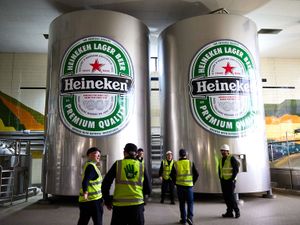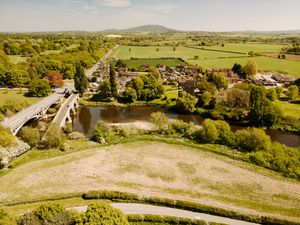Shropshire sees ‘significant drop’ in EU workers after Brexit vote
The number of EU citizens registering to work in Shropshire and Mid Wales has has seen a significant drop since the Brexit vote, new figures have revealed.
The largest drop has been in the area covered by Shropshire Council, with 165 fewer people successfully applying for National Insurance numbers, which are required to work or claim benefits.
In Telford & Wrekin's council area the figure has fallen by 131, and in that covered by Powys County Council the drop is 47.
The largest drop in those applying in all three areas has been the 'EU8' countries, which joined in the European Union's 2004 enlargement and included Poland and the Czech Republic.
In Shropshire 197 signed up, 105 fewer than in the year before the Brexit vote, while in Telford & Wrekin the figure was 404, 183 fewer than before the referendum. In Powys 81 signed up – 69 fewer than before the Brexit vote
The drop in EU applicants comes against a background of an increase in the number of people from the rest of the world registering for NI numbers.
See also:
In Telford & Wrekin a total of 228 people from the rest of the world registered in the 12 months up to March, a rise of 14 on the period before Brexit.
From outside of Europe, the regions with the highest number of applications were Sub Saharan Africa and South Asia, which includes India and Pakistan, with 80 registrations.
In Shropshire 185 people from the rest of the world registered for NI numbers in the same period, increasing from 28 in the same period before the referendum.
From outside of Europe, the region with the highest number of applications was the Middle East and Central Asia, with 64 registrations.
Powys however saw a fall in the number of applicants from outside the EU, with 57 applicants representing a decline of 11. The highest number of applications came from South Asia, which includes India and Pakistan, with 14 registrations.
Sectors
Despite the drop in the number of EU applicants the amount of people successfully registering for NI numbers across the three areas is still nearly 2,500.
In the 12 months up to March this year 1,148 people EU citizens successfully registered from Telford & Wrekin, 928 from Shropshire, and 275 from Powys.
Traditionally a number of sectors have used foreign workers, including the NHS and farming.
David Brookes, regional dairy board chairman, said that agriculture had been one of a number of industries affected by the referendum result.
He said farms were suffering from a shortage of skilled labour but that the government is working on a system that will help farmers post Brexit.
Mr Brookes added: "Dairy farmers and all farms are at the moment in severe competition for labour. There is not sufficient labour to do what are now very highly skilled jobs on farms.
"The education system has severely failed agriculture. Agriculture is very skilled now and highly paid and there are not sufficient people wanting to get involved in farming.
"Following the referendum the pound became effectively revalued and they were not having as much money to take home to their families so the UK is no longer of such interest to work in. So farms and agriculture have been exposed to a situation where we are a country with full employment and a lack of skilled workers coming into farms.
"A lot of original migrants have chosen to take other roles in other sectors too so there is a major recruitment problem and major competition with other sectors.
"I know the government is working very hard to come up with schemes to ensure we have workers to fill the void,which is in a number of sectors, such as the health service and agriculture."
Farmers depend on these seasonal manual workers
Our British harvest needs manual workers – and that has in recent years depended heavily on staff coming from Europe.
Any shortage could, say farmers, result in rotten crops and lost profits.
Jonathan Evans of the Shropshire NFU said fruit, vegetable, plant and flower farmers are especially vulnerable. He said: “Almost every country in Europe has a scheme or permit system that enables non-EU workers to work for a temporary period doing seasonal jobs.
“The solution for British horticulture and agriculture is the same solution that the rest of Europe offers to its farming businesses.
“There are levels of low unemployment across Europe and we need a commitment there will be sufficient numbers of permanent and seasonal workers for our farm businesses.”
Eurosceptic Gill: Brexit means fairer migration
Brexit will make it easier for skilled migrants to meet the needs of the UK as it would not discriminate against non-EU countries, said leading Shropshire eurosceptic Christopher Gill.
Mr Gill, who as Conservative MP for Ludlow was one of the leading rebels against the Maastricht Treaty during John Major’s government in the 90s, said he had no view on whether a fall in the number of EU migrants coming to work in Britain was a good or bad thing.
Mr Gill said the present policy of free movement between EU countries was unfair.
“I was talking to an Australian nurse the other day who told me they have to take a language test before they come in, it’s quite bizarre,” he said.
“Brexit will mean we can have an immigration policy that does not discriminate against the rest of the world, and treats the EU the same.”





